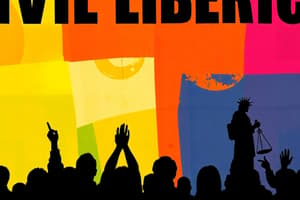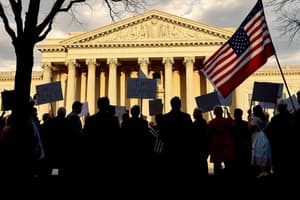Podcast
Questions and Answers
What does the exclusionary rule prevent?
What does the exclusionary rule prevent?
- Citizens from practicing their religion freely
- The government from collecting taxes on personal income
- The prosecution of individuals without a trial
- The use of illegally obtained evidence in court (correct)
Which of the following accurately describes civil rights?
Which of the following accurately describes civil rights?
- Guaranteed rights to equal treatment by government authorities (correct)
- Rights derived from historical court rulings
- Limitations on government power to ensure personal freedoms
- The ability to refuse military service based on moral grounds
What is the purpose of the establishment clause?
What is the purpose of the establishment clause?
- To allow the government to collect taxes for religious institutions
- To ensure that military service is optional for all citizens
- To enforce strict laws against selling alcohol
- To prevent the government from favoring any religion over others (correct)
Which term describes the government's power to take private property for public use?
Which term describes the government's power to take private property for public use?
What does the term 'conscientious objector' refer to?
What does the term 'conscientious objector' refer to?
What is the purpose of the Miranda warning?
What is the purpose of the Miranda warning?
Which of the following best describes probable cause?
Which of the following best describes probable cause?
What is the main objective of the Patriot Act?
What is the main objective of the Patriot Act?
What does the Sherbert test evaluate?
What does the Sherbert test evaluate?
What defines symbolic speech?
What defines symbolic speech?
What does selective incorporation refer to?
What does selective incorporation refer to?
What constitutes an undue burden in legal terms?
What constitutes an undue burden in legal terms?
What does the free exercise clause protect?
What does the free exercise clause protect?
Flashcards
Common-law right
Common-law right
A right of the people rooted in legal tradition and past court rulings, rather than the Constitution.
Eminent domain
Eminent domain
The power of government to take or use property for a public purpose after compensating its owner; also known as the takings clause of the Fifth Amendment.
Civil liberties
Civil liberties
Limitations on the power of government, designed to ensure personal freedoms.
Civil rights
Civil rights
Signup and view all the flashcards
Due process clause
Due process clause
Signup and view all the flashcards
Probable cause
Probable cause
Signup and view all the flashcards
Free exercise clause
Free exercise clause
Signup and view all the flashcards
Miranda warning
Miranda warning
Signup and view all the flashcards
Right to privacy
Right to privacy
Signup and view all the flashcards
Search warrant
Search warrant
Signup and view all the flashcards
Selective incorporation
Selective incorporation
Signup and view all the flashcards
Symbolic speech
Symbolic speech
Signup and view all the flashcards
Undue burden test
Undue burden test
Signup and view all the flashcards
Study Notes
Civil Liberties and Rights
- Civil liberties are limitations on government power to protect individual freedoms.
- Civil rights ensure equal treatment by government authorities.
- Common-law rights are based on legal tradition and court rulings, not the Constitution.
- Conscientious objectors refuse military service based on conscience or religion.
Constitutional Protections
- Double jeopardy prevents prosecution twice for the same crime by the same government.
- Due process clause restricts government from unfairly taking "life, liberty, or property."
- Economic liberty protects individual rights to obtain, use, and trade things.
- Eminent domain allows government to seize property for public use, with compensation.
- Establishment clause prevents government endorsement of a state religion.
- Exclusionary rule prohibits use of illegally obtained evidence in court.
- Free exercise clause protects individuals' religious beliefs and practices from government interference.
- Miranda warning informs suspects of their rights during arrest or interrogation.
- Obscenity refers to extremely offensive acts or statements.
- Plea bargain allows defendants to plead guilty for a lighter sentence.
- Prior restraint stops someone from doing something before it happens.
- Probable cause is a lower standard for search and seizure than criminal trial proof.
- Right to privacy protects individuals from government intrusion.
- Search warrant is a document authorizing police to search and seize.
- Selective incorporation gradually applies Bill of Rights to states.
- Self-incrimination is an action that admits guilt.
- Sherbert test assesses laws that infringe on the free exercise of religion.
- Symbolic speech communicates ideas without words or writing.
- Undue burden test assesses laws that restrict women's access to abortion.
Specific Laws and Policies
- Blue laws are laws that uphold religious or moral standards, often prohibiting activities on specific days.
- Patriot Act broadens federal powers to monitor communications after 9/11.
Studying That Suits You
Use AI to generate personalized quizzes and flashcards to suit your learning preferences.




